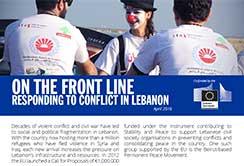A quarter of Lebanon’s population are refugees, and each new arrival fleeing the violence in Syria and Iraq just increases pressure on the country’s fragile infrastructure. Furthermore, decades of conflict and civil war have left the country socially and politically fragmented. There are real concerns among some local communities that the flood of Syrian refugees could increase existing sectarian tensions and turn into a permanent armed presence; many Lebanese have bitter memories of the civil war in which Palestinian militias played a role.
In order to ease these tensions between different ethnic and religious groups, an IcSP project entitled ‘Harnessing Local Capacities for Resilience in the face of the Syrian Crisis’ brought together locals in order to identify common concerns and practical ways of making life better for everyone. The project focused on the rural areas of Wadi Khaled, Hermel and Badghan, which are economically underdeveloped and host large numbers of refugees. They also represent the sectarian spread of refugees in Lebanon: Wadi Khaled is a mainly Sunni area, Hermel Shiite and Badghan Druze.
To begin with, communities were consulted in order to gauge their views on what their most pressing needs were. Everyone agreed that water was a major problem. In 2013 – the year that this project started – Lebanon experienced low rainfall but increasing water consumption, exacerbated in part by the strain of coping with new arrivals.
Through interviews and local dialogues, participants reviewed local and international water laws and were trained in conflict prevention and resolution. A joint advocacy campaign for better water management was then developed for each of the project areas. The project was about water, but it was also about rethinking the resilience of Lebanese society; recognising the non-sectarian aspects of problems; and developing collective action to deal with them.
“As we were helping the local stakeholders, we were developing our capacities and methodology as well,” explains head of the project team Fadi Abi Allam. “To train is also to follow up the work with local communities, to empower civil society, to acquire more experience on our side and to provide an example [that] we can apply elsewhere in Lebanon.”
The project was implemented by the Beirut-based Permanent Peace Movement (PPM) in partnership with International Alert. PPM’s next step is to build on the success of this project and implement best practices in 20 villages in the Bekaa region. Some of these villages have two or three times as many refugees as their original population.
For more information, read the full project description here.
COMMUNITY-DRIVEN SOLUTIONS IN LEBANON

